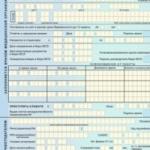Recently, the concepts of insurance and work experience, as two combined, but different under certain circumstances, have become of acute concern to Russians. Theoretically, work activity ends with retirement, and at the same time a new social status is acquired.
In practice, when preparing documents for payment, not only the time when a person worked, but also when they were paid for him will be taken into account insurance premiums. These periods may be different for some older people, so they need to figure out in advance what the differences are. seniority from insurance period, what role they play for calculating pensions.
Basic Concepts
Dear readers! The article talks about typical ways to resolve legal issues, but each case is individual. If you want to know how solve exactly your problem- contact a consultant:
APPLICATIONS AND CALLS ARE ACCEPTED 24/7 and 7 days a week.
It's fast and FOR FREE!
When determining rights to a pension benefit, not only the length of time a person worked officially throughout his life is taken into account, but also the periods when an enterprise or individual entrepreneur paid contributions to the Pension Fund, deducted from his earnings. These periods are called insurance period.
If during the working period, for example, a citizen of the Russian Federation worked abroad for some time, but insurance contributions were made to the Russian Pension Fund, then this length of service can be classified as insurance.
The total duration of the insurance period also includes periods when a citizen did not work due to certain circumstances, but received insurance benefits and made contributions to the Pension Fund during:
- , this also applies to family members of military personnel when, due to the conditions of being in a military unit, they could not work (a period of no more than 5 years);
- temporary disability due to illness;
- maternity leave until reaching 1.5–3 years, and when caring for the third and subsequent children, the experience will not be considered insurance;
- transfer to a place of work remote from the previous one (another city, region, country);
- participation in public works;
- the period when the citizen(s) were fired or laid off, were temporarily unemployed and were registered as unemployed;
- stay in places of deprivation of liberty;
- cared for disabled persons (disabled people, elderly parents, children older 3 years).
The insurance period also includes a period called special, when citizens work in conditions harmful to health, which is associated with the peculiarities of performing work duties, climatic and other circumstances. In this case, insurance contributions to the Pension Fund must be deducted.
Upon the onset of a period of temporary incapacity due to illness, caring for children or persons incapable of labor activity, according to the legislation of the Russian Federation, citizens receive insurance payments. But, at the same time, contributions to the Pension Fund are made, so the length of service can be called insurance. The amount of the insurance benefit is calculated depending on the total length of service and the employee’s monthly salary.
Work experience refers to the period when an individual was officially engaged in labor or social activities. Having official work experience is a necessary condition for receiving social benefits, such as insurance payments and pensions, as provided for by the Labor Code of the Russian Federation. The basis for the beginning and end of work experience is the conclusion between the employer and the employee of a contract or agreement on the basis of which the work will be carried out. job responsibilities or community service.
Despite the fact that there are differences between insurance and work experience, there are exceptions when the period can be called insurance experience, but at the same time the person did not work
- No work was carried out, and contributions to the Pension Fund were deducted.
- The citizen was in public service. This includes the entire period of time when he (s) was actively working in a government agency. In this case, the employee is entitled to a bonus for length of service, as well as additional time for rest and other benefits.
- Special experience, which will be considered insurance and labor at the same time. This is the time when a citizen was engaged in labor activities associated with harmful conditions, which gives them the right by law to retire early.
The legislator believes that for calculating a pension, a total length of work experience of 5 years, but you should not count on large pension payments that the Pension Fund will assign. Each subsequent officially worked year of work can potentially increase the amount of pension accruals.
Continuous work experience refers to the length of time when an employee worked for one employer. But about 10 years ago, the legislator defined other requirements for the calculation of benefits for temporary disability and pensions, for which the concept of continuity of service has lost its meaning.
When accruing pension payments Still, there are exceptions when continuous and insurance periods are compared with each other, and if it turns out that the insurance period is less than continuous, then the pension benefit will be calculated based on the continuous one.
This happens in cases where:
- the break period between the new and old place of work is shorter 30 days according to the calendar;
- the employee quit of his own free will for no apparent reason and got another job, the break between work activities is no more 3 weeks;
- the citizen resigned due to the transfer of the spouse to a place of work located in another city, region, or country;
- a woman is forced to care for a disabled child until he reaches 16 year old age;
- a woman takes out maternity leave;
- the woman decided to care for the child until he reaches 14 years and she has a supporting document in the form of a medical certificate.
Addition of periods
An employee’s insurance period can be determined for the purpose of calculating pension payments in two ways:
- Insurance periods for calculating a pension should be added up when the employee has several of them, each of them can consist of several years, months and days. Whatever whole parts the insurance periods consist of, years, months and days should be added together separately. In the data obtained, you should also select whole parts, for example, if there are 15 months, then you should add 1 more to the years, and leave 3 months. If, for example, you get 45 days, then you should select 30 of them as 1 month, which will be added to the months, leaving 15 days. The end result should look, for example, like this - 4 years, 8 months, 16 days.
- When periods are converted into full years and months, i.e., full terms are allocated. Using this method, you should convert years and months into days, and add the latter. Then the resulting number of days must be divided by 30 (the number of days in a month), and the result by 12 (the number of months in a year). The result obtained may, for example, look like this - 4.76. In this case, the insurance period will consist of 4 years And 7–8 months. The method of isolating entire periods is not entirely accurate, so the first method is more often used - adding periods.
Proof
The presence of insurance experience must be documented, but initially you should find out whether the person was insured or not. While there is no pension insurance yet, documents issued by the employer or a state municipal body can serve as evidence for its registration. This is a labor record, which contains notes about all the workplaces where the citizen worked.
In other cases, when there is no book, you can use employment contracts, certificates, excerpts from orders, service records, references from places of work and other supporting documents.
When physical the person is already insured, then the confirming document will be an extract from the personal account with an individual number. Personal accounts are issued for specific citizens. The personal account keeps records of all insurance proceeds; the statement will confirm when and in what amounts contributions were made.
Based on this, you can determine the duration of the insurance periods, which is what is needed to calculate your pension. The document is received personally by the citizen in the Pension Fund at the place of residence.
What is the difference between work experience and insurance experience?
When calculating a pension, it is important to understand how the total length of service differs from the insurance period, which is taken into account for calculations. During this period, an employee who works officially pays contributions to the Pension Fund.
A document confirming the presence and duration of total work experience, or the totality of its periods, is a work book. It is issued to every employee when he first officially gets a job.
In the document during the working life of the individual. a person is entered into data about the places where he is employed, positions held, reasons for dismissals or transfers to another organization, confirmed by orders for the enterprise. It is in the labor report that changes throughout the working life are clearly reflected.

The insurance period may also differ from the total working period when the subject received higher education, because during their studies students do not make insurance contributions to the Pension Fund
It is most often impossible to determine the insurance length of service, because often subjects do not work, for example, they are registered with the Employment Center, but receive benefits or financial assistance, make contributions to the Pension Fund. In this case, the length of service will be insurance, on the basis of which the subject will be entitled to pension payments.
On the contrary, if the subject has experience that is not included in the labor record for various reasons, in order to record it, you will need to submit supporting documents. But such length of service will not be considered insurance for the subject and will not be taken into account when calculating a pension if during this period the monthly amount of insurance contributions to the Pension Fund was lower than the generally accepted minimum wage at that time.
Not many people know what insurance experience is and how it differs from labor experience. According to the legislation of the Russian Federation, when calculating pensions after 2002, it is the insurance period that is taken into account.
Insurance refers to the period of time during which an able-bodied person was officially employed and contributions were made to the Pension and Insurance Funds for him. This period also includes some periods of incapacity for work, which are also taken into account when calculating the pension. These include:
- the time when an able-bodied citizen cared for a disabled person of group 1 or a disabled child;
- when a parent took leave to care for an infant up to one and a half years old, for a total of no more than 4.5 years;
- when an able-bodied citizen cared for an elderly person over 80 years of age;
- was unemployed, but was registered with the labor exchange and received unemployment benefits;
- the time when the person was in military service;
- residence of military spouses in military camps where there is no opportunity for full-time employment for 5 years;
- for spouses of diplomats, the first 5 years of residence abroad are counted;
- at the time of imprisonment, if the person was subsequently found innocent;
- took part in socially useful works that were paid officially;
- temporary disability when a person was paid benefits.
Currently, the amount of pension accrual directly depends on the insured working hours.
Until 2002, the size of the pension depended directly on the length of service. It refers to the time when an able-bodied person was working and pension contributions were made for him.
Entries in the work book about hiring and dismissal are considered the basis for recording the period of beginning and end of working time. The dates included in the employment contract have a similar effect.
Work experience also means certain periods time when a person did not work for good reasons. Such reasons include the following:
- Special, associated with harmful and life-threatening work activities. This period is taken into account in the insurance and work experience. This type of work provides grounds for early retirement.
- Periods when there was no work activity, and pension contributions continued to be deducted.
- All period civil service. All civil servants have the right to receive a pension based on length of service, earlier retirement and many other benefits.
Currently for accrual minimum size To qualify for an insurance pension, you must have 7 years of such experience. And every year this amount increases until the established maximum of 15 years is reached.
Thus, in a few years, in order to receive an insurance pension, a citizen will have to have 15 years of work experience, as well as:
- achieve the established retirement age 60 and 55 years for men and women respectively;
- accumulate the total amount pension points 30.
If all three conditions are met, citizens will be able to apply for a labor pension.
Continuous work experience
There is also the concept of a continuous working period when an employee worked at one enterprise a large number of years. If you have labor awards, you can receive the title “Veteran of Labor,” which provides good benefits:
- during taxation;
- when paying for utilities;
- when traveling in public transport;
- medical;
- labor;
- social and some others.
In the Soviet Union, for the sake of these benefits, many citizens worked for decades at one enterprise. But now young workers have almost no opportunity to receive this title, since awards are practically not given out.
Therefore, at present, a continuous working period does not in any way affect the future pension.
Calculation of insurance period
Many people change jobs periodically during their working lives, and there are periods that do not qualify for time-of-work insurance. In this case, it is necessary to add up those periods that are considered insurance. There are 2 methods of calculation in this case:
- By adding separately years, months and days.
- By rounding to full terms and adding only years and months.
The first method is more accurate, so it is used in practice much more often. When calculating, it is important to deduct all the time when a person was on vacation at his own expense or missed work.
Insurance periods also include the time when a person was engaged in individual entrepreneurial activity. The calculation takes into account the time of operation of a legal entity from its opening to its official closure.
When calculating the insurance period, the following documents confirming it are taken into account:
- employment history;
- employment contracts;
- certificates from the place of work indicating periods of work;
- certificates from archives confirming the period of work;
- military ID;
- other documents confirming the beginning and end of the period that is taken into account.
IN special cases if a work record book is lost through no fault of your own, the testimony of 2-3 witnesses may be taken into account.
Who counts
The calculation of the insurance period can only be calculated for a certain category of citizens that meets the established conditions. These conditions include the following:
- compulsory pension insurance;
- foreign citizens residing permanently in Russia, subject to regular contributions to Pension Fund;
- disabled citizens who are family members of the insured citizen in the event of his death.
If one or more of the listed conditions is present, a person has the right to calculate the insurance period and receive pension provision.
Types of insurance experience
The legislation of our country distinguishes several types of insurance periods, which can be classified as follows:
- Continuous, when a person did not interrupt the working period for a certain time, for which deductions were made to the PRF. In this case, the period between dismissal from one place and employment in another place should not be more than 1 month.
- Mixed, when a person worked in ordinary organizations and in government agencies. If there are not enough years to receive a long-service pension, this period will be included when calculating the labor pension.
- Special involves periods of work in unfavorable, life-threatening working conditions.
- General - includes all listed periods of insurance coverage.
Therefore everything working population Those who plan to retire no earlier than 2024 must make contributions to the Pension Fund for at least 15 years and accumulate at least 30 pension points in the amount of these contributions. The amount of 1 point is indexed annually depending on inflation. Only in this case will it be possible to apply for pension benefits in the future.
The branch of the Russian Pension Fund for the Kostroma Region explains the difference between labor and insurance experience.
On January 1, 2015, the concept of “ labor pension" It was replaced by two types of pensions: insurance and funded. Insurance pension Today it is the main type of pension in the Russian Federation.
One of the factors influencing the right to receive and the amount of an insurance pension is length of service. There is a distinction between insurance experience and general work experience. What is the difference between these concepts?
Insurance experience is the duration of periods of work for which insurance contributions to the Pension Fund of Russia were calculated and paid, as well as non-insurance periods. Such periods include, for example, military service, one parent caring for a child up to one and a half years old (but not more than six years in total), caring for a disabled person of group I, a disabled child or an elderly person over 80 years old by an able-bodied citizen, etc.
These periods are included in the insurance period if they were preceded and (or) followed by periods of work, regardless of their duration, during which insurance premiums were paid to the Pension Fund. If several periods included in the length of service coincide in time, then when assigning a pension, only one of them is taken into account at the choice of the citizen who applied for the pension.
Since 2015, the pension rights of citizens for each working year have been recorded in individual pension coefficients, or as they are also called, pension points. When a pension is assigned, points are converted into rubles. For socially significant periods of life, which are also included in the length of service as non-insurance periods, points are also awarded.
Total length of service is the total duration of periods of work and other socially useful activities before January 1, 2002.
The assessment of the pension rights of insured persons as of January 1, 2002 is carried out by converting them into estimated pension capital. In this case, the option for assessing pension rights is used that allows the citizen to establish a pension in the largest amount.
Calculation of the duration of periods of work before January 1, 2002, included in the total length of service, is carried out in calendar order according to their actual duration. The exception is the periods included in the total length of service when assessing pension rights under paragraph 4 of Article 30 Federal Law dated December 17, 2001 No. 173-FZ “On labor pensions in Russian Federation" Some periods of work before January 1, 2002 can be assessed as one year and a half, two years, three years. In addition, work for a full navigation period in water transport and work for a full season in organizations of seasonal industries are included in the length of service as full year work regardless of the actual duration of these periods.
When calculating the calculation of pensions, the Pension Fund of the Russian Federation takes into account two values - the total length of service and the insurance period. It is important to understand that these are different concepts, and only the length of service determines the right to receive a labor pension. It only includes certain periods of a person’s life. And length of service is the total period of a person’s work throughout his life: it can be seasonal, home-based, temporary, etc. However, a citizen’s pension will be accrued only for those periods of work when he worked under an officially concluded employment contract and the employer contributed the corresponding contributions to the Pension Fund.
What is included in the insurance period
According to the current pension legislation, total length of service is the entire period of a person’s working activity, and insurance length of service is the periods of work during which contributions to the Pension Fund of the Russian Federation were paid. Only the insurance period is taken into account when calculating the final retirement pension. And often it does not coincide with the total duration of a person’s work.
In addition to periods of official employment, the insurance period includes the following periods of time:
| Period | Explanation |
| Periods of temporary incapacity for work | During which the citizen received social insurance benefits |
| Time to care for a child under one and a half years of age | There may be several such periods, but in total they cannot exceed 6 years. The period of child care can be taken into account by the mother or the father. |
| Time for providing unemployment benefits | The insurance period also takes into account the time spent performing public paid work. |
| Time of detention in case of unjustified prosecution or unjustified repression | This period is taken into account only if the citizen was found to be unfairly convicted or repressed |
| Time to care for a disabled child, a disabled person of the 1st group or an elderly person over 80 years old | This fact must be documented |
| Periods during which military spouses lived in places where it was impossible to find work and be officially employed | The total duration of such periods should not exceed 5 years |
| Duration of residence abroad for spouses of diplomatic workers | Up to 5 years in total |
What is included in general work experience?
Another important question is what is included in the total length of service. It is understood as the total duration of an employee’s work activity. This parameter is used:
- when determining length of service;
- calculation of disability pension;
- in some other situations.
REFERENCE
After pension reform In 2002, the concept of length of service was actually replaced by the term “insurance period,” and this led to some changes in calculations.
Until 2012, total work experience included periods of full-time study at a university. However, later it was decided to exclude them from the insurance period and not to take them into account when calculating pensions, since during these years students are not officially employed and do not pay contributions to the Pension Fund of the Russian Federation.
The total length of service includes periods during which a person is registered as unemployed and receives benefits. It also includes:
- travel time military service on call;
- period of caring for a child up to one and a half years old;
- period of care for disabled and elderly people;
- some other time periods.
A separate concept is special experience- this is the time of work under special conditions that give the right to receive pension benefits and additional accruals.
From January 1, 2015, Russia will introduce new order calculation of pensions and formation of pension rights of citizens. In accordance with the legislation, the length of the insurance period required to acquire the right to an old-age pension will change significantly - from 5 years currently to 15 years under the new law. The term “labor pension” is leaving the legislation. An insurance pension will be assigned.
The insurance period is the periods of work of a citizen during which insurance contributions to the Pension Fund were accrued and paid for him. In addition, it also includes the so-called “non-insurance” periods: maternity leave for up to 1.5 years, receiving unemployment benefits, care of an unemployed able-bodied citizen for a group I disabled person, a disabled child and a person over 80 years old, the period of participation in paid public works, etc. Now the term “insurance period” is used when determining the right to a pension.
Total length of service is the total duration of labor and other socially useful activities until January 1, 2002. It is taken into account when assessing the pension rights of citizens with periods of work before 2002. The size of the pension as of January 1, 2002 depends on the length of work experience; after this date, the pension depends only on the insurance contributions paid.
We would like to add that starting from 2015, the size of the pension will be influenced by both the length of service and the amount of insurance contributions. Each year of work will be assessed in individual pension coefficients, or points. The sum of these coefficients will constitute the pension capital, which will be converted into cash equivalent upon the citizen’s retirement.





